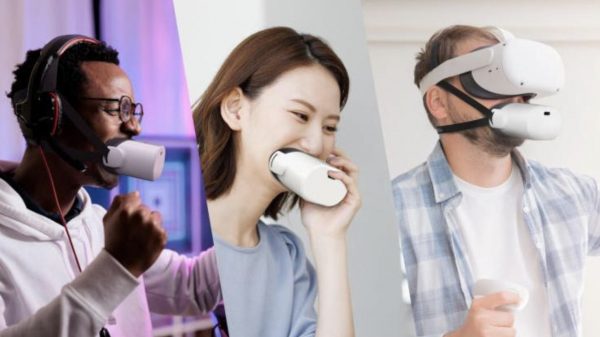International micro-licencing and music solutions company, Lickd is paving the way for content creators to commercialise popular music in their games, videos and other forms of content, removing copyright and demonetisation fears.
The company now allows successful creators to not only license some of the best songs in their content but can also promote their tracks across gaming content alongside catalogues of popular music too.
In its mission to bridge the worlds of music and sports in the metaverse, Lickd has penned agreements with music label and publishers Empire and Kobalt Music Group, who are licensing their music catalogues to bring the noise to the open-source VR world of Decentraland’s Vegas City.
We caught up with Paul Sampson, CEO of Lickd to learn about the company’s gamification of music, achieving funding from Fortnite creators as well as how the company could adopt artificial intelligence in its service.
What kind of user would be interested in your service?
Essentially, content creators are our core audience. Music is an incredible tool for setting the mood in any video, the right track can elevate a good video to a great video, but it is important to be aware of YouTube’s rules around copyright.
Powerful software on platforms such as YouTube and Instagram usually catch creators out who’ve used popular music over their content, which can effectively demonetise this instantly and in some cases, it can be taken down. Creators utilising Lickd are reaping the benefits twofold, being protected from the infringement technology and having access to in excess of 1.4 million songs, with another 6 million delivered and waiting to go live.
Can you tell us how the partnerships you’ve established have impacted Lickd’s growth?
Over the past two years, we’ve already entered into partnerships with the likes of Warner Music Group (in August 2020). And in September 2021, we secured £5.1 million ($7m) in funding from investors including WMG and Fortnite creator Epic Games, which bought D2C music platform Bandcamp in March 2022.
Our ongoing deals and partnerships will see us continue to make full catalogues of millions of songs available to content creators, further expanding Lickd’s library of tracks. As the content creator space continues to expand, there is a huge opportunity for all types of business to invest in new areas and to work hand-in-hand with companies such as ours to positively transform the music industry.
As the content creator space continues to expand, there is a huge opportunity for all types of business to invest in new areas
As we partner with more names like Epic and Warner, this continues to deliver a win-win for all – for Lickd as we continue to expand, for the creators who want commercial music to better monetise their content, for the artists who want to be paid fairly for their work and for the broader ecosystem as we create new ways to grow.
How has Lickd addressed challenges related to music rights ownership and licensing?
We’ve addressed this twofold, firstly by working hard on partnerships to develop and grow our ecosystem of available licenced content. We plan to continue to engage new partners and effectively expand our offering more and more as time goes on. This is truly an industry first in terms of the sheer level of access our users have.
Secondly, Lickd micro-licences act as a sort of ‘secret weapon’ for content creators. After using popular music to soundtrack their content, Lickd also doubles up as a layer of protection in the creator’s monetisation pipeline, covering their content from infringement technology on platforms such as YouTube, to ensure they secure the rewards they deserve for their content.
After using popular music to soundtrack their content, Lickd also doubles up as a layer of protection in the creator’s monetisation pipeline, covering their content from infringement technology
What is your approach to data privacy and how does Lickd handle user data and personal information?
Paul Sampson: On the content creator side, we ingest user data upon account creation, which is a fairly typical procedure. We don’t share that user data with any other third parties and only use it to optimise our users’ experience, and to deliver them more pertinent music selections. In gaming and virtual, we pick up a very minimal amount of user data.
Our users in the metaverse are the venues we partner with. In this world, it’s a different style of data capture, whereby we track heartbeats and the heartbeats of avatars. These tokens identify to our systems that there’s another person in a venue that needs their music delivered to their device. But this is behind a privacy wall, and we don’t see any data about who they are or any personal information.
Can you discuss any specific use cases for AI on the Lickd platform, such as improving music discovery or enhancing the licensing process?
The uptake of AI in music creation won’t be instant, but at some point, creators will become of faith with smart tools that allow them to generate music through these new means for use in videos. Although, once created, that music will still need to be licensed, and there will be commercial models that give users access to the tools and/or licensing opportunities for the music created by said tool.
Generative AI is useful for creating ‘music stems’, and building a sort of catalogue of music elements that can then be used by people collaboratively to start making an entire song
In the metaverse, there will be music collaboration spaces and music production event areas or venues. Generative AI is useful for creating ‘music stems’, and building a sort of catalogue of music elements that can then be used by people collaboratively to start making an entire song – something that was not happening in the past.
How do you plan on addressing concerns around bias and fairness in the use of AI, and what steps are you taking to ensure that your algorithms are transparent and equitable?
AI will be able to continuously keep churning out new beats and new melodies, riffs and instrumental sounds, but there will always be a need for people – and human input. People will get together to create music on the fly, but beyond the initial utilisation of AI generative tools to create the base chords or pattern, the human layers beyond that are never going to be fully redundant. Music is emotive, and comes from personal experience, which an AI will not always be able to replicate.
AI will be able to continuously keep churning out new beats and new melodies, riffs and instrumental sounds, but there will always be a need for people – and human input
How do you see AI and shaping the future of the music industry more broadly, and what challenges and opportunities do you foresee as a result?
There’s various ways that AI will impact music. It’s something we’re following closely and it would be foolish for anyone to suggest that any part of the music industry isn’t already seeing some element of business being affected directly by AI. So far we’ve seen AI-generated songs, well-known songs of one artist being sung in the AI voice of another and the fact that chords and melodies can be created by simply inputting into an AI, and we’re always expecting more.
Regarding the metaverse, how do you plan on leveraging the nascent space?
I think it’s important to outline that wherever there is opportunity for the music industry online, it will require some sort of micro-licensing commercial model, and some sort of proprietary tech, either to enable the licensing or to protect the end user.
That’s where Lickd is perfectly positioned. Our mission is to democratise music for the world’s creators. Our first product looked at creators as video content creators, but as the world changes and the digital landscape evolves, creators will also include builders in the metaverse.
We all know that the metaverse is inevitable. We’ve all been in it in some description as early as 15 years ago, when virtual meetings became incepted, and experiences like ‘The Sims’ and ‘Second Life’ were popular. But as time goes on, it will just start to play a bigger and bigger role in future generations’ lives.
We all know that the metaverse is inevitable… It will play a bigger and bigger role in future generations’ lives
The metaverse is very early on in its development, but it will eventually get there. And so the opportunity for the music industry is posing the questions to creators like, ‘How can we help the metaverse sound good?’ ‘How can we all benefit from that?’ and ‘How can we enable it by building proprietary technology and creating the viable commercial model.
What challenges do you see ahead?
A challenge for any modern music company is always the delay in the music industry’s adoption of any model and the impact that can have on a business. Dragging the industry into the 21st century has always been difficult when it comes to adopting innovation. If you think about every single major innovation the industry has seen, it always comes from third parties; it’s never coming from within and every institution in the music industry works in a silo.
The entire digital landscape is going to continue to evolve faster and faster as a result of AI and the metaverse
I think the other challenge is looking outward. The entire digital landscape is going to continue to evolve faster and faster as a result of AI and the metaverse. All these things combined will result in what’s going to be a very unsettled space for the industry to keep up with the pace of change. We must remain at the forefront of working on collaborative solutions, being aware of influences, including developments from the new frontiers of metaverse, AI, blockchain and web3.
Isa Muhammad is a writer and video game journalist covering many aspects of entertainment media including the film industry. He's steadily writing his way to the sharp end of journalism and enjoys staying informed. If he's not reading, playing video games or catching up on his favourite TV series, then he's probably writing about them.






































